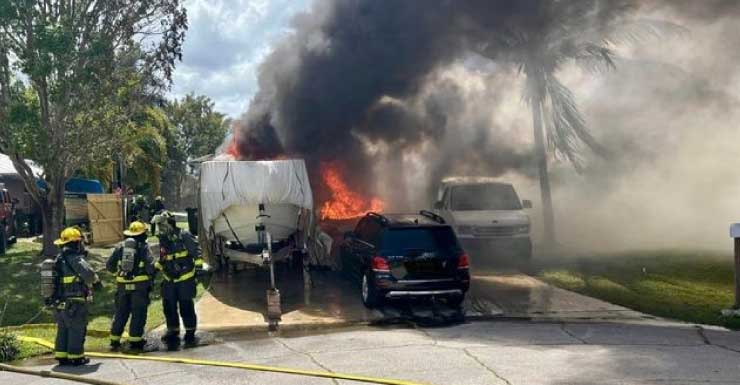18 Fla. L. Weekly Supp. 32a
Online Reference: FLWSUPP 1801UBED
Insurance — Personal injury protection — Appeals — Mandate is recalled where previous opinion relied on now-quashed case — Demand letter — Premature demand letter sent before claim became overdue is deficiency that could be cured by sending second demand letter while suit was pending — Premature demand letter is not deficiency that requires abatement or voluntary dismissal and refiling of action to cure
UNITED AUTOMOBILE INSURANCE COMPANY, Appellant, vs. DORA MAURICIA UBEDA, Appellee. Circuit Court, 11th Judicial Circuit (Appellate) in and for Miami-Dade County. Case No. 07-475 AP & 08-037 AP. L.C. Case No. 06-23427 SP 25. September 21, 2010. Appeal from a final summary judgment rendered by the Miami-Dade County Court, Hon. Lawrence D. King. Counsel: Ivy R. Ginsberg, United Automobile Insurance Company, Office of the General Counsel, for Appellant. Virginia M. Best, Lopez & Best, for Appellee.
(Before SILVERMAN, EMAS and FERNANDEZ, JJ.)
ON SECOND MOTION FOR REHEARING
[Original Opinion at 17 Fla. L. Weekly Supp. 327a]
(PER CURIAM.) Ms. Dora Mauricia Ubeda (“insured”) filed her second motion for rehearing on March 5, 2010. The mandate issued on March 5, 2010. We find that the mandate issued prematurely, before the fifteen-day timeframe expired. Fla. R. App. P. 9.330(a). Thus, the insured timely filed her second rehearing motion. Florida Rule of Appellate Procedure 9.330(b) does not permit more than one rehearing motion. Perez v. State, 932 So. 2d 357 (Fla. 3d DCA 2006) [31 Fla. L. Weekly D1693a]. Further, this second rehearing motion does not address a substantially-amended previous opinion. Consequently, we deny the insured’s second rehearing motion. Cf. Dade Fed. Sav. & Loan Ass’n v. Smith, 403 So. 2d 995 (Fla. 1st DCA 1999). However, having reviewed our February 19, 2010 opinion and having determined that we relied upon Progressive Express Ins. Co. v. Menendez, 979 So. 2d 324 (Fla. 3d DCA 2008) [33 Fla. L. Weekly D811a], subsequently quashed by Menendez v. Progressive Express Ins. Co., Inc., 35 So. 3d 873 (Fla. 2010) [35 Fla. L. Weekly S222b], we recall the mandate and issue this second revised opinion.1
In this personal injury protection (PIP) appeal, we consider whether an insured’s premature demand letter, required by statute as a condition precedent to filing suit, is a deficiency which can be cured by the sending of a second demand letter while the lawsuit is pending (or by the mere passage of time), or is a deficiency which necessitates an abatement, or voluntary dismissal and refiling, of the lawsuit. We hold, under the facts of this case, that neither abatement nor dismissal is required and affirm the trial court’s entry of summary judgment in favor of the insured.
The insured sustained injuries in an automobile accident on August 13, 2006. She received medical treatment between August 15, 2006 and September 13, 2006. On September 14, 2006 (before the bills for the medical treatment became overdue), she sent a demand letter, pursuant to section 627.736(11), Florida Statutes, to United Automobile Insurance Company (“United”). The demand letter notified United of the insured’s intent to initiate litigation.
United did not respond to the demand letter. More than three months after sending the demand letter, the insured filed a complaint against United for its failure to pay benefits for the August 15 through September 13, 2006 bills. United asserted only one affirmative defense — that the treatment was not reasonable, related or necessary. The insured amended her complaint to include subsequent medical treatment provided from September 14, 2006 to October 24, 2006. United amended its answer and affirmative defenses and asserted the demand letter’s prematurity and that the insured failed to meet all conditions precedent before filing suit.
The insured sent United a second demand letter, which sought payment for all medical bills for treatment from August 15, 2006 through October 24, 2006. Following this second demand letter, the insured filed a second amended complaint alleging that she sent a second demand letter to United. United filed its answer and affirmative defenses to the second amended complaint, again raising the demand letter’s prematurity as an affirmative defense.
The insured moved for summary judgment on the issue of reasonable, related and necessary. The trial court granted the motion.2 On appeal, United contends that the insured could not cure the premature demand letter absent abating or dismissing (and refiling) the action. We disagree.
Section 627.736(11), Florida Statutes (2005)3, controls this matter and provides:
(a) As a condition precedent to filing any action for benefits under this section, the insurer must be provided with written notice of intent to initiate litigation. Such notice may not be sent until the claim is overdue, including any additional time the insurer has to pay the claim pursuant to paragraph (4)(b).
***
(d) If, within 15 days after receipt of notice by the insurer, the overdue claim specified in the notice is paid by the insurer together with applicable interest and a penalty of 10 percent of the overdue amount paid by the insurer, subject to a maximum penalty of $250, no action may be brought against the insurer. . . . The insurer is not obligated to pay any attorney’s fees if the insurer pays the claim or mails its agreement to pay for future treatment within the time prescribed by this subsection.
(emphasis added).
By this subsection’s plain language, the claimant must send a demand letter before commencing litigation but may not send it until the claim becomes overdue. By requiring a demand letter before filing suit, the insurer receives notice that the insured believes the claim is overdue and intends to file suit, giving the insurer an opportunity to pay the claim and avoid unnecessary litigation, attorney’s fees, or other statutory penalties. In the case at bar, the insured sent the letter to the insurer prematurely by sending it before the claims became overdue.4
We analyze this demand letter while considering the personal injury protection statutory scheme. The goal of ensuring swift payment to the insured must be balanced against preventing improper claims against the insurer. United Auto Ins. Co. v. State Technologies, 787 So. 2d 920 (Fla. 3d DCA 2000) [26 Fla. L. Weekly D1237b]. Florida courts liberally construe the personal injury protection statute in the insured’s favor, to fulfill its remedial purpose of providing broad personal injury protection insurance coverage. Blish v. Atlantic Cas. Co., 736 So. 2d 1151 (Fla. 1999) [24 Fla. L. Weekly S204a]; State Farm Mut. Auto. Ins. Co. v. Pressley, 28 So. 3d 105 (Fla 1st DCA 2010) [35 Fla. L. Weekly D150b]. We consider other statutory schemes containing presuit notice requirements and decisions construing such requirements.
The medical malpractice presuit requirement outlined in Chapter 766, Florida Statutes, provides a closely analogous statutory scheme. That chapter establishes a presuit investigation procedure that both the plaintiff and defendant must follow before filing a medical malpractice lawsuit. The first step requires a plaintiff and his counsel to conduct a reasonable investigation to determine whether reasonable grounds exist to believe that someone acted negligently in the plaintiff’s care and treatment, and that such negligence caused the plaintiff’s injury. §766.104, Fla. Stat. No medical malpractice action may be filed unless the attorney, based upon the investigation, obtains a good faith belief that negligence occurred and caused plaintiff’s injury. The plaintiff may establish such good faith by obtaining an expert’s written opinion. Id. After conducting a reasonable investigation, plaintiff must send defendant a notice of intent to initiate litigation, which must be corroborated and accompanied by a verified written medical expert opinion. §§766.106 and 766.203, Fla. Stat. The defendant then has 90 days to conduct its own presuit investigation, during which time plaintiff may not file suit. §766.106(3)(a), Fla. Stat.
In Kukral v. Mekras, 679 So. 2d 278 (Fla. 1996) [21 Fla. L. Weekly S251a], plaintiff served defendant with notice of his intent to initiate litigation for medical malpractice. However, the notice failed to include a verified written medical expert opinion. At the expiration of the 90-day investigation period, defendant sent a denial of the claim, accompanied by an expert’s affidavit opining that no negligence occurred. Plaintiff then sent defendant a verified medical expert opinion alleging negligence and then filed suit.
The Supreme Court reversed the trial court’s dismissal: “ ‘[W]hen possible the presuit notice and screening statute should be construed in a manner that favors access to the courts. . . . This is particularly so when, as here, defendants have not been prejudiced by plaintiff’s actions’.” Kukral, 679 So. 2d at 279-80 (quoting Patry v. Capps, 633 So. 2d 9, 13 (Fla. 1994)). In reaching this decision, the Court quoted a district court opinion:
In [Hospital Corp. Of America v.] Lindberg, [571 So. 2d 446 (Fla. 1990], the Florida Supreme court was faced with essentially the same question which confronts us here: Is a medical malpractice plaintiff’s failure to comply with the presuit screening process provided by Chapter 766 within the applicable statute of limitations fatal, as a matter of law, to the plaintiff’s cause of action? The supreme court held in Lindberg that the answer to the question is no. It held that the plaintiff could proceed so long as the notice of intent and the complaint were filed within the statutory period.
In that case, the plaintiffs had failed to allege compliance with presuit notice investigation requirements, and the defendants contended that upon expiration of the statute of limitations, the trial court was without subject matter jurisdiction to allow amendment of the complaint to include allegations of compliance with the statutory requirements. The supreme court disagreed with that conclusion, and held that where a complaint and presuit notice are simultaneously filed and served within the applicable statute of limitations, the plaintiff may subsequently (even after expiration of the statutory period) file an amended complaint asserting compliance with the presuit screening process.
Kukral, 679 So. 2d at 282 (quoting Stebilla v. Mussallem, 595 So. 2d 136, 139 (Fla. 5th DCA 1992)).
The Kukral Court noted that in prior decisions
[w]e made it clear. . .that compliance with the prefiling notice requirement of section 768.57 [the previous version of the medical malpractice statute] was a condition precedent to maintaining an action for malpractice and, although it may be complied with after the filing of the complaint, the notice must be given within the statute of limitations period.
Id. at283.
The Chapter 627 presuit requirement’s underlying purpose is closely analogous to the medical malpractice statute’s presuit requirements. The reasoning of Kukral applies to the case before us. Given the Supreme Court’s recognition that courts must liberally construe the personal injury protection statute to strike the proper balance between the underlying statutory purpose and a citizen’s constitutionally guaranteed access to the courts, we find the trial court did not commit error by not dismissing the action.
At the summary judgment hearing, the court found that United failed to establish that the premature demand letter caused any prejudice justifying dismissal or abatement. The trial court found that the second demand letter — together with the amended complaint and the passage of time — cured any ostensible prejudice.5
The failure to send any presuit demand letter prior to filing suit might well present a more compelling circumstance requiring abatement. However, in this case, the insured sent a demand letter, but did so before the claim became overdue.6 Nevertheless, United received actual notice that the insured intended to file suit, a primary purpose underlying the presuit procedures. Given the statute’s remedial purpose and no prejudice to United, we hold that the passage of time cured the first demand letter’s prematurity. We affirm the summary judgment and the trial court’s judgment awarding attorney’s fees to Ubeda.
Affirmed.
__________________
1Although our court term expired (see Fla. Stat. §26.32 (2009)), because a rehearing motion remained pending before the fifteen-day timeframe expired, we have jurisdiction to recall our mandate. Plucinik v. State, 885 So. 2d 478 (Fla. 5th DCA 2004) [29 Fla. L. Weekly D2436a]; Zielke v. State, 839 So. 2d 911 (Fla. 5th DCA 2003) [28 Fla. L. Weekly D719b].
2The trial court later entered a judgment awarding attorney’s fees to Ubeda pursuant to section 627.736(8), Florida Statutes. United appeals this judgment as well.
3The current version of the demand letter provision is found at §627.736(10), Florida Statutes. However, the statute’s 2005 version governs because it was the statute in effect at the time the parties entered into the insurance contract. See Hassen v. State Farm Mut. Ins. Co., 674 So. 2d 106 (Fla. 1996) [21 Fla. L. Weekly S102c].
4Section 627.736(4)(a), Florida Statutes, provides: “Personal injury protection insurance benefits. . . shall be overdue if not paid within 30 days after the insurer is furnished written notice of the fact of a covered loss and of the amount of same.”
5United asserted that if it timely paid the bills following receipt of the second demand letter (and while the lawsuit was pending) that this would have amounted to a “confession of judgment,” subjecting it to liability for attorney’s fees. However, the trial court indicated that this potential issue could have been addressed at the conclusion of the case, so that United Auto would not be harmed (nor Ubeda rewarded) by the premature service of the initial demand letter.
6The distinction between the two circumstances was aptly described in Grip Dev., Inc. v. Coldwell Banker Residential Real Estate, Inc., 788 So. 2d 262, 270-71 n.8 (Fla. 4th DCA 2000) [25 Fla. L. Weekly D2240b] (Farmer, J., dissenting): “Just as one recognizes a difference in consequences from being in line beforehand and getting there after the train has already left the station, so the law applies different consequences to filing or doing an act prematurely and filing or doing an act too late.”




 how can I help you?
how can I help you?